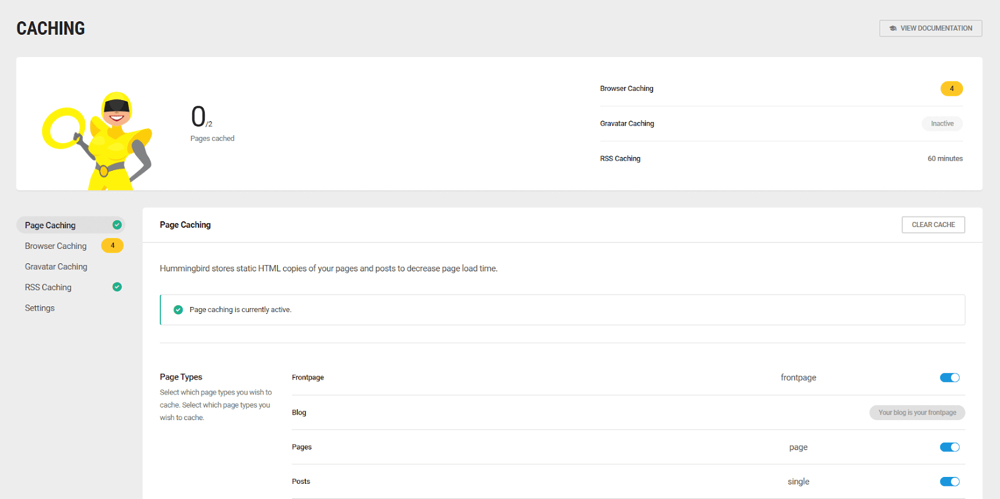If you’re in the market for a complete caching system for WordPress, even with some dashboard inconsistencies, Hummingbird Pro is a viable solution that allows for the integration of several caching tools all in one place. In Hummingbird, you can access the minification engine through the Asset Optimization tab within WordPress: The plugin will scan your site’s files and let you optimize whichever ones you like. You can even move certain ‘behind-the-scenes’ code files to your site’s footer here, if you’re familiar with CSS. Support » Plugin: Hummingbird – Optimize Speed, Enable Cache, Minify CSS & Defer Critical JS. Hummingbird re-establishes the link between farmers and consumers, and are committed to connecting local farms with their community. Hummingbird guarantees freshness. Most fresh food travels an average of 1500 miles before reaching its final destination. We offer a catering service that is geared toward the smaller crowd. A special occasion with family and friends, a weeknight dinner at home, or even just a Tuesday at the office. We will do our best to accommodate your gathering with heart and hospitality. Choose from our Workplace meal options (delivery available), Homemade Here.
Excessive load times can harm your website in more ways than one. There are quite a few ways to improve your site’s speed but caching has the greatest impact.
With the above in mind, in this article we’re going to evaluate the performance of the top eight caching solutions for WordPress. We will also look at the features each one has on offer to help you determine which one is truly the best (not just the fastest).
Here’s the lineup: WP Rocket, W3 Total Cache, WP Super Cache, WP Fastest Cache, WP-Optimize, Cache Enabler, Hummingbird, and Swift Performance.
Note: while this post was originally written in 2015, we completely re-tested all of the plugins in February, 2019 and then again in August 2020. We have updated the testing data sections and the conclusion section to reflect this new testing data.
Setting the Stage
To test how these caching plugins actually perform, we installed each one on a test site and ran tests using WebPageTest. To eliminate single-test variability, we configured WebPageTest to run nine separate tests and then took the mean average of those nine tests. This average is the number that you see in our comparison tables.
Before installing any plugins, we took also baseline reading of our test site without any caching plugin installed.
For reference, our test site is using the popular Astra theme as well as one of its full starter sites built with Elementor (our review). Here’s the exact starter site that we’re using – all the homepage content is built with Elementor, which should create a pretty realistic testing scenario.
Other than that – there’s nothing special going on. Nor have we made any performance enhancements prior to the caching plugins that we’ll be testing. It is hosted on a well-optimized cloud VPS from DigitalOcean, however, which gives it a pretty strong foundation.
As for the caching plugins, we’re going to use the default settings for each plugin as much as possible. We know there are some drawbacks to this approach – but there’s not really a “fair” way to do it otherwise and we needed some consistent basis for comparison.
By default, we mean that we won’t do any in-depth tweaking beyond say, turning on caching (and minification if available).
For reference, here are the details for our test site before installing any of the caching plugins:
Hummingbird For Wordpress
- Average Load Time: 1.72 s
Note – the information that you see in the WebPageTest screenshots is for the median test run while we’re taking the mean average of all nine tests. That’s why the numbers aren’t the same.
At the end of this post, we’ll have a nice table summarizing all the test results for each plugin so that you can easily compare them all.
Best WordPress Caching Plugins
01.WP Rocket
- Average: 1.45 s
WP Rocket is one of the best caching solutions for WordPress and the only 100% premium plugin on our list. It is tremendously user-friendly and a lifesaver for webmasters who find technical terms and web programming to be perplexing.
The plugin will function correctly after activation; as a result, you won’t be smacking your head against the wall trying to configure it. Those of you who are technologically literate can dive into its advanced options and set up a custom configuration.
Features
WP Rocket is a feature-rich caching plugin that offers cache preloading, browser caching, GZIP compression, and options for HTML, CSS, and JavaScript minification and concatenation.
Here’s what you get:
- Simple, fast, and intuitive setup.
- Page caching is immediately activated.
- Google Fonts Optimization minimizes HTTP requests.
- Code optimization (minification and combination)
- JavaScript files are deferred till the page is rendered.
- Integrates seamlessly with Cloudflare.
- Options to locally host Google Analytics and Facebook Pixel.
- Heartbeat control.
- Lazy loading for images and videos.
- GZIP compression
Speed Tests
After installing WP Rocket, we turned on minification but didn’t otherwise change any of the default settings.
02.W3 Total Cache
- Average: 1.50 s
W3 Total Cache is the most feature-rich (and complicated) caching plugin on our list.
The first thing you need to know about this plugin is that its settings area is divided into 16 pages. Whoa! This may be quite overwhelming (even for some developers) but the important thing to remember is that you don’t have to manually configure the settings to make the plugin work – its default settings work pretty great too.
W3 Total Cache has a dedicated settings page for every type of caching – page caching, object caching, database caching, browser caching, etc. The level of customizability that you get with W3 Total Cache is difficult to find elsewhere.
Features
- Tons of small configuration options
- GZIP compression to optimize web browser rendering.
- Minification and concatenation of HTML, CSS, and JavaScript files.
- Support for content delivery networks (CDN).
- Compatible with Cloudflare.
Speed Tests
W3 Total Cache is known for its massive settings options. Here’s all we did for this test, though:
- Enabled page caching
- Turned on automatic minification
03.WP Super Cache
- Average: 1.45 s

WP Super Cache is a free caching solution available for WordPress. It comes directly from Automattic, the same company behind WordPress.com and WooCommerce.
In addition to page caching, it also includes a few other optimization tactics. However, in general, it’s pretty simple.
Features
- Page caching.
- Support for content delivery networks (CDN).
- Caching for visitors using a mobile device.
- Browser caching.
- Scheduler to manage deletion and re-caching at given intervals.
- GZIP compression.
Speed Tests
With WP Super Cache, all we did was turn caching on.
04.WP Fastest Cache
- Average: 1.48 s
According to its developers, the WP Fastest Cache plugin is “the simplest and fastest WP Cache system”. It offers an easy-to-enable page caching feature along with other optimization tactics such as minification, GZIP compression, browser caching, and an option for combining JavaScript and CSS files together to reduce requests from your server.
Features
Hummingbird Wordpress
- Mod_Rewrite which is the fastest method is used in this plugin
- All cache files are deleted when a post or page is published
- Supports CDN
- Enable/Disable cache option for mobile devices and logged-in users
- Block cache for specific page or post
- Code minification
- GZIP compression
Epiphone Hummingbird Pro Acoustic Electric Guitar
Speed Tests
With WP Fastest Cache, we turned on the Cache System and enabled minification for HTML and CSS.
05.WP-Optimize
- Average: 1.45 s
WP-Optimize is a WordPress caching plugin from the same developers as the popular UpdraftPlus backup plugin. It started as a tool to clean your site’s database before morphing into a full caching and performance optimization solution.
In addition to caching and database cleaning, it also includes an image compression feature.
Features
- Page caching
- Automatic or manual database cleaning and optimization
- Image compression
- GZIP compression
- Browser caching
Speed Tests

With WP-Optimize, all we did is turn on the page caching feature.
06. Cache Enabler
- Average: 1.48 s
Cache Enabler is a lightweight caching solution for WordPress that really only focuses on page caching. Because of that, it’s definitely the simplest option on this list – it literally only has a few settings.
Features
- Page caching
- Display of the actual cache size in your dashboard
- Cache exclusion rules
Speed Tests
Normally, we recommend tag-teaming Autoptimize with Cache Enabler. But to keep the test fair, all we did was enable Cache Enabler.
07.Hummingbird
- Average: 1.56 s
Hummingbird is a WordPress caching and performance plugin from WPMU DEV. It offers a well-designed interface along with tons of features that you can use to optimize your site.
Features
- Page caching
- GZIP compression
- Browser caching
- Code minification
- Option to eliminate render-blocking resources
Speed Tests
All we did was enable Hummingbird’s page caching feature.
08. Swift Performance Lite
- Average: 1.50 s
Swift Performance is another popular all-in-one performance plugin like WP Rocket. It comes in both a free version and a paid version and it aims to help with every part of WordPress performance, even letting you disable plugins on certain pages.
For this test, we used Swift Performance Lite, which is the version that’s available for free at WordPress.org.
Features
- Page caching
- Pre-set optimization templates that you can quickly apply
- Code optimization (minification and combination)
- Browser caching
- Database optimization
- Plugin organizer to disable plugins on certain pages
Speed Tests
Swift Performance comes with a nice set of presets that you can quickly apply. We used the Simple Caching preset.
Comparison Table
Here’s a comparison table of the page load times of all eight caching plugins in order. We also included the percent reduction in page load times vs the control test.
As you can see, all eight plugins made a noticeable improvement over the default state, ranging from a 15.7% reduction in page load times for the top-performing plugin to a 9.9% reduction for the lowest-performing plugin.
Why isn’t the reduction as dramatic as some other tests? Well, remember that our test site is hosted on a cloud VPS from DigitalOcean, which is already pretty fast by itself. If you installed any of these plugins on cheap shared hosting, you’d probably see much larger reductions in the realm of 30-40%.
The Best Caching Plugins Ranked
After running nine separate performance tests for each caching plugin, we have a three-way tie for first place with the following plugins:
Of those three plugins…
- WP Rocket only comes in a premium version.
- WP Super Cache is 100% free at WordPress.org.
- WP-Optimize uses a freemium model (though we only tested the free version at WordPress.org).
So – which one should you choose? That depends on your features and needs…


If you’re on a budget and want something simple, you definitely won’t go wrong with WP Super Cache or WP-Optimize.
If you’re willing to pay, WP Rocket is a great option. While the data shows that you don’t need to pay, some of the advantages of WP Rocket are that:
- You get access to premium support to help you set up the plugin, which is nice to have if you’re not an advanced user.
- It does a lot more than caching. While we didn’t enable all of these settings to keep things fair and standardized, you can go further than we did in our comparison and eke out some extra performance.
- It still works with popular hosts that ban other caching plugins, such as Kinsta, WP Engine, etc.
Additionally, while these three plugins performed the best in our test, other options like WP Fastest Cache and Cache Enabler were not far behind, so you certainly won’t go wrong if you like one of those plugins’ feature sets.
Which caching solutions do you use for your WordPress site? What features do you look for in a caching plugin? We’d love to hear from you so let us know in the comments section below.
